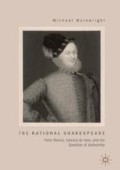Abstract
Without government intervention, self-interest endangers shared interests, but with that involvement, self-interest promotes the common good. This policy requires the artful manipulation of individuals into a cohesive unit. William Burghley was masterful in putting Thomas Smith’s notions into practice. Edward de Vere’s father-in-law instituted democratic advances in resisting both an empire ruled by a tyrannical monarch and a republic ruled by chaos and disorder. Extraludic tactics can outflank coordinative stipulations, but Antony and Cleopatra offers transcendence as the ultimate evasion of logical dilemmas. Oxford’s critical appreciation of Ramism informed this insight. Antony and Cleopatra presents the immutable framework of interrelational ontology as an inescapable facilitator of human relations.
I hear him mock
The luck of Caesar, which the gods give men
To excuse their after wrath.
—William Shakespeare, Antony and Cleopatra (5.2.279–81)
Access this chapter
Tax calculation will be finalised at checkout
Purchases are for personal use only
Notes
- 1.
The prominent part played by Spring, or Ver, at the close of Love’s Labour’s Lost finds an aural resonance at the end of The Merchant of Venice, which closes on the word “ring,” in a scene that concerns two marriages (Portia’s union with Bassanio and Nerissa’s union with Gratiano). In effect, this double figuration turns that final word from “ring,” or the Italian “vera,” into “rings,” or the Italian “vere.” As with Love’s Labour’s Lost, Oxford signs The Merchant of Venice, as Haste notes, “in exactly the place where you and I would sign our names to something we had written” (25).
- 2.
The term “Cleopatrician” (166) arises in James Joyce’s Finnegans Wake (1939).
- 3.
Whalen reports that the word “‘worm’ […] occurs only once or twice in about half of the other plays, sometimes to mean a serpent, usually to mean an earthworm or maggot, as in ‘the worm of conscience’ (Richard III, Much Ado About Nothing)” (12).
Author information
Authors and Affiliations
Rights and permissions
Copyright information
© 2018 The Author(s)
About this chapter
Cite this chapter
Wainwright, M. (2018). Assurance Games in Antony and Cleopatra (Part 2). In: The Rational Shakespeare. Palgrave Macmillan, Cham. https://doi.org/10.1007/978-3-319-95258-1_12
Download citation
DOI: https://doi.org/10.1007/978-3-319-95258-1_12
Published:
Publisher Name: Palgrave Macmillan, Cham
Print ISBN: 978-3-319-95257-4
Online ISBN: 978-3-319-95258-1
eBook Packages: Literature, Cultural and Media StudiesLiterature, Cultural and Media Studies (R0)

